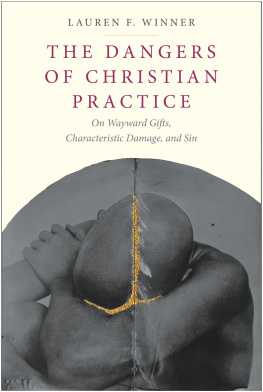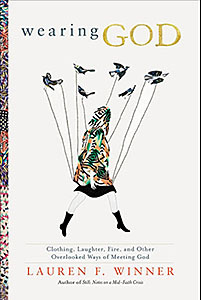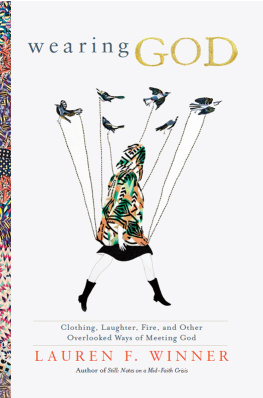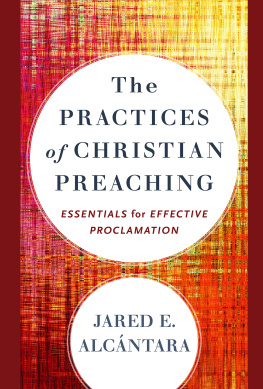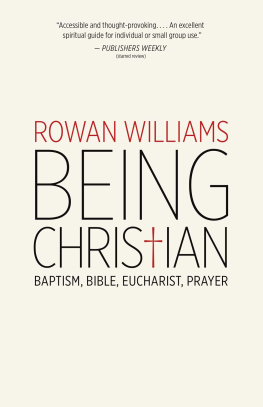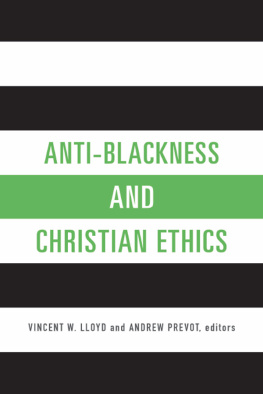The Dangers of
Christian Practice

Published with assistance from the foundation established in
memory of Henry Weldon Barnes of the Class of 1882, Yale College.
Excerpts from the poem Lineage Maker, by Robyn Covelli-Hunt,
from Lines and Circles, A Celebration of Santa Fe Families, edited by
Valerie Martnez, appear courtesy of Sunstone Press, Santa Fe, New
Mexico.
Quotations from A Plantation Mistress on the Eve of the Civil War:
The Diary of Keziah Goodwyn Hopkins Brevard, 18601861, edited
by John Hammond Moore, appear courtesy of the University of
South Carolina Press, Columbia, South Carolina.
All biblical citations are to the New Revised Standard Version
unless otherwise specified.
Copyright 2018 by Lauren F. Winner.
All rights reserved.
This book may not be reproduced, in whole or in part, including
illustrations, in any form (beyond that copying permitted by
Sections 107 and 108 of the U.S. Copyright Law and except by
reviewers for the public press), without written permission from
the publishers.
Yale University Press books may be purchased in quantity for
educational, business, or promotional use. For information, please
e-mail
(U.K. office).
Set in Minion type by IDS Infotech Ltd., Chandigarh, India.
Printed in the United States of America.
Library of Congress Control Number: 2018930926
ISBN 978-0-300-21582-3 (hardcover: alk. paper)
A catalogue record for this book is available from the British
Library.
This paper meets the requirements of ANSI/NISO Z39.48-1992
(Permanence of Paper).
10 9 8 7 6 5 4 3 2 1
This book is, in part, a quarrel with Stanley Hauerwas.
It is dedicated to him, with gratitude in equal measure for his
friendship, and for his having given the world
ideas worth quarreling with.
With what pencil shall I be able to draw the deformed face of sin?
THOMAS WATSON
Contents
The Dangers of
Christian Practice
Characteristic Damage
I n this book I consider some of the ways beloved Christian practices deform. I examine how Christian practices, like the Eucharist and prayer, are damaged and extend damage, and I argue that when a Christian practice goes wrong, often it does so not incidentally but rather in ways that have to do with the practice itself. Although twenty-first-century Anglophone Christians often speak of practices like Eucharist and prayer only to commend them and laud the benefits they bestow upon practitioners, Christians need also to give accounts of, rather than evade, the damages Christian practice sustains by sin; in The Dangers of Christian Practice I attempt some of that accounting.
Nothing, not even the good practices of the church, is untouched by the Fall. The principal effect of the Fall is damage, though that damage operates differently in and on human beings than it does in and on, say, rocks. Human beings, creatures with agency, sustain damage and immediately intensify the damage by doing things that cause further harm (and, of course, being creatures with agency that is being rehabilitated by God, we also sometimes do things that can make things better, more beautiful, healed). Rocks, by contrast, are creatures without agency, so they do notcannotintensify the damage they have sustained. Once they have sustained damage, they just do what damaged rocks do: sit mutely; sometimes roll down a hill and kill someone; sometimes provide a picnic spot for a hiker; sometimes sparkle in a necklace; and eventually get eroded.
Sin is whats ushered in by the Fall and produces all this damage. That is, the word sin denotes habits, actions, and proclivities of human beings (and other creatures with agency, such as angels and perhaps certain other nonhuman primates) that draw what God created away from God and that unleash damage into the world. The state of the damage is, by contrast, not a state of sin, although one often hears Christians colloquially speaking as though it were; no state like that exists, because sin is an absence (of the good), not a thing in itself. The state of damage is just thata state of damage, one that creatures with agency perpetuate. Sometimes, the damage done by creatures with agency is causally related to the structural damage of creatures without agency. For example, the planet does not have agency. Rather, the planet simply reflects the damage unleashed by agents sin. In sometimes alarmingly specific ways, some human actions that intensify damage not only harm us but also damage and intensify damage done to other creatures, such as the planet. We can melt ice caps, strip mountains, destroy species, and change temperatures, for example.
The Bible is full of testimony to the damage that even inanimate objects have sustained and express. The Bible likes to speak of this in terms of soundscape: Creations groaning happens only because of our sin; were Creation not damaged, it would not groan. Similarly, our sin has brought about silences where there should be sound. The silence of the psalmists mountainsmountains that should, and will, be singingis also caused by (our) sin. If the mountains were not damaged, they would sing, and when God has consummated Gods program of healing and redemption, they will.
Creatures are damaged, and creatures with agency perpetuate damage, in many different ways. The damage sometimes is arbitrary, or at least seems to be (human beings, in our damage, cannot confidently distinguish between being and seeming). By arbitrary, I mean incidental to (rather than properly related to, or properly about) whatever is damaged or is perpetuating damage. But sometimesoftenthings are damaged (or perpetuate damage) in ways that are about whatever is damaged or damaging. That is, the damage is often expressed in a way that is proper to that which expresses the damage.
Therefore, because nothing created is untouched by the Fall, Christians should not be surprised when lovely and good, potentially gracious Christian gestures are damaged, or when human beings deploy those Christian gestures in the perpetuation of damage. Because often damage is expressed in a way that is not arbitrary, but is proper to what is expressing it, Christians ought to be able to predict some of the characteristic damages that might be found in those potentially gracious gestures, and Christians ought to be able to predict some of the ways in which human beings put those gestures to work in perpetuating damage.
In this book I read Christian practicespractices of the church, like the Eucharist and prayerunder the pressure of the foregoing understanding of sin and damage, with the aim of encouraging the church to be on the lookout for the ways good Christian practices may, and inevitably sometimes will, do the very opposite of what those practices were made, in their goodness (in Gods goodness, and in Gods good hopes for the church), to do. I read Christian practices with the aim of encouraging the church to anticipate the ways good Christian practices sometimes will not foster intimacy with God and growth in Christlikeness, but will rather perpetuate damage. (Nota bene: The practices themselves do not, of course, have agency, but practices necessarily involve agents. For this reason, one can speak of practices sometimes perpetuating damage, with the understanding that this is shorthand for the agents of those practices perpetuating damage, and the practices expressing that damage.)
God created all things with forms. When created, formed by God, these creatures were perfectthe shape of every creature, whether an ocean or a lion or a human being, was all good, all Godward, all lovely. But in the present era, after the Fall and before the consummation of Gods redemption, none of the things God formed is wholly good. We have lost some of our goodness; it has vanished into absence and curvature. We are all still formed as God formed us, but now our forms are distorted and our actions sometimes perverse.
Next page
